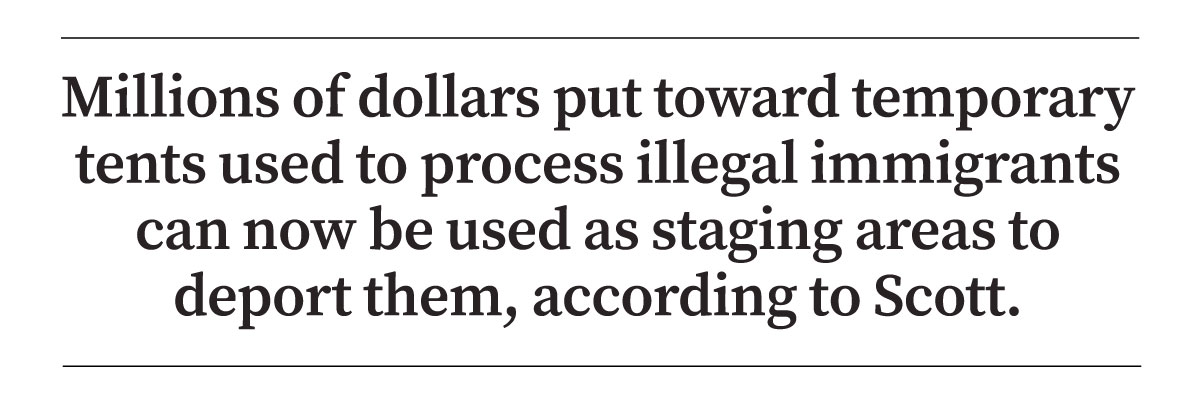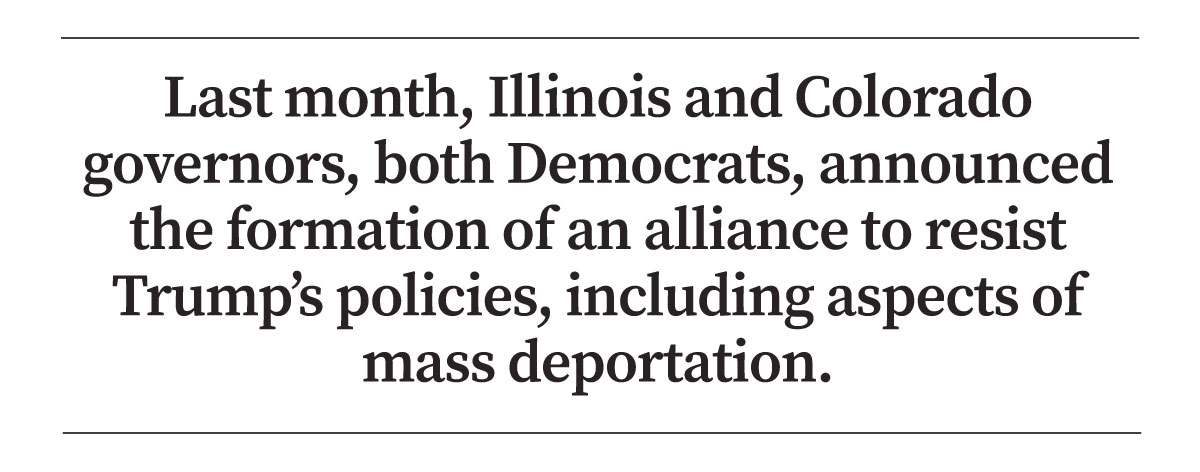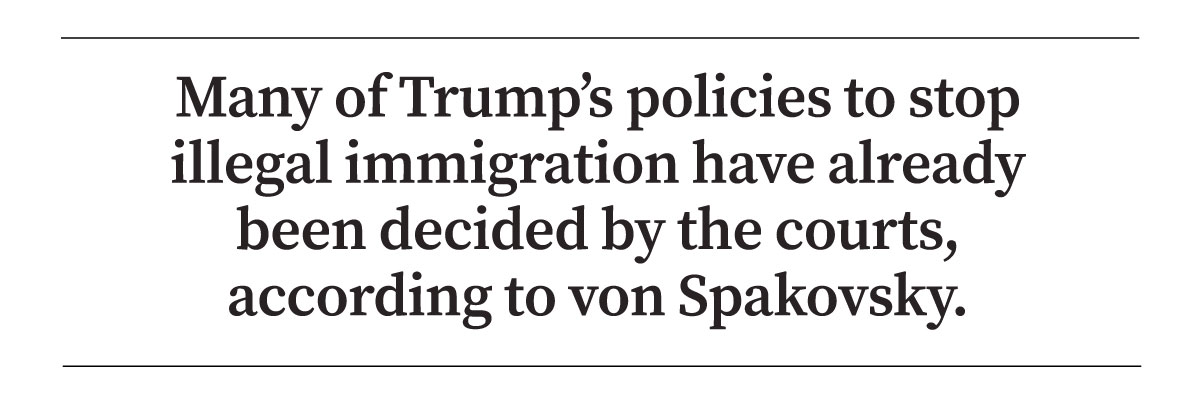EAGLE PASS, Texas—Incoming border czar Tom Homan has made it clear that states such as Texas are about to have an ally in the White House when it comes to securing the U.S. southern border.
Homan and Texas Gov. Greg Abbott are promising a new era of cooperation between the federal government and states eager to secure the border as President-elect Donald Trump’s deportation plan takes shape. The two served early Thanksgiving meals to Texas Department of Public Safety law enforcement and Texas National Guard members last week.
“The first morning I woke up with a smile on my face was the day after the election when President Trump won because he’s going to come back. He’s going to finish the job he started,” Homan, the former acting head of U.S. Immigration and Customs Enforcement (ICE), said.
Ideas floated by Trump and Homan so far include quickly rolling back policies from the Biden administration, issuing a national emergency declaration and using the military to assist in deportations, reinstating executive orders from Trump’s first administration, activating the 1798 Alien Enemies Act, defunding nongovernmental organizations (NGOs), and partnering with willing states.
Homan praised the Texas model of border enforcement from the past four years, which included erecting fencing and razor wire along the border, placing barriers in the Rio Grande, and building its own border wall. Texas recently offered the incoming administration a 1,400-acre ranch to use as a deportation hub.
Homan said the sheer number of unvetted illegal immigrants crossing the border has also created a threat to national security that must be addressed.
He said illegal immigrants who evade capture—known as gotaways, and not counted in the 10.8 million illegal immigrant encounters documented by U.S. Customs and Border Protection since 2021—are particularly concerning because they don’t want to get caught.
“If you don’t think a single one of the 2 million that came from a country sponsor of terror aren’t coming to do us harm, then you’re an idiot,” Homan said.
Details of what the national model might look like remain in flux. Logistically, removing millions of illegal immigrants stands to be complicated, especially with resistance expected from some sanctuary states and pro-immigration groups.

Migrants, who are part of a a caravan heading toward the United States, check a map during a break on the outskirts of Escuintla, Mexico, on Nov. 7, 2024. (Moises Castillo/AP Photo)
Partnering With States
Hans von Spakovsky, senior legal fellow at the Heritage Foundation, said he expects the Trump administration will immediately drop federal lawsuits against state efforts to stop illegal immigration.
“I have no doubt that Tom Homan will direct DHS [the Department of Homeland Security] to work hand and glove with states like Texas, that want to stop this,” von Spakovsky told The Epoch Times. “It'll be a complete reversal of what’s happened over the past four years.”
Trump has nominated South Dakota Gov. Kristi Noem to lead DHS, which encompasses ICE, Border Patrol, and several other agencies including the U.S. Secret Service and the Federal Emergency Management Agency.
Former Chief of the U.S. Border Patrol Rodney Scott, who served under both Trump and Biden, told The Epoch Times that Trump will likely build upon what he did in his first term.
Scott, who is now a senior fellow for border security with the Texas Public Policy Foundation, said the Trump administration could expand the 287(g) program.
The program is currently used to coordinate how ICE takes custody of illegal immigrants arrested on criminal charges by state and local law enforcement.
However, it could be expanded to allow a task force to train and deputize local and state law enforcement to arrest illegal immigrants.
Under federal law, sanctuary states and cities cannot stop federal agents from apprehending illegal immigrants, Scott said.
What will likely happen in those states and cities is that ICE will have to take illegal immigrants into custody by going to their homes instead of picking them up in jails.
Scott said that a lot of the money being used to aid illegal immigrants can now be put toward enforcement.
For example, millions of dollars put toward temporary tents used to process illegal immigrants can now be used as staging areas to deport them.
Scott said that while the Trump administration may prioritize removing criminals and those with deportation orders first, people who have overstayed a visa or crossed into the country illegally are not safe from deportation under the law.

President Donald Trump speaks with U.S. Border Patrol Chief Rodney Scott as they participate in a ceremony commemorating the 200th mile of the border wall in San Luis, Ariz., on June 23, 2020. (Saul Loeb/AFP via Getty Images)
State and City Pushback
While some state leaders are happy to work with the federal government to stop illegal immigration, others have vowed to push back.
The governors of Massachusetts and Arizona have indicated they won’t allow the use of state resources to cooperate with Trump’s deportation agenda.
“No, absolutely not,” Massachusetts Gov. Maura Healey said in an MSNBC interview shortly after Trump won the presidential election.
“I do think it is important that we all recognize that there is going to be a lot of pressure on states and state officials. I can assure you we’re going to work hard to deliver.”
Arizona Gov. Katie Hobbs said she would cooperate with Trump on stopping the illegal importation of fentanyl, but she suggested that deportation of illegal immigrants would harm Arizona families.
“I will stand up to protect Arizonans from harm by the federal government, from anyone,” Hobbs said. “I’m not going to comment on hypotheticals. We don’t know what a mass deportation plan will look like, what resources it will involve.”
In November, the Illinois and Colorado governors, both Democrats, announced the formation of an alliance to resist Trump’s policies, including aspects of deportation.
Illinois Gov. JB Pritzker and Colorado Gov. Jared Polis are leading the newly created “Governors Safeguarding Democracy” to prevent “authoritarianism” and the “undermining of democratic institutions.”
New York Gov. Kathy Hochul said during a news conference on Nov. 26 that she would work with Trump on deporting known criminals who are in the country illegally.

U.S. Border Patrol agents moniter illegal border crossings in Jacumba, Calif., on Jan. 10, 2024. (John Fredricks/The Epoch Times)
However, she said that if the incoming administration tries to “harm New Yorkers or roll back their rights,” she would fight it “every step of the way.”
Likewise, leaders of Democrat-run cities such as Los Angeles and Denver have announced they have no plans to cooperate with the deportation of illegal immigrants.
In November, the Los Angeles City Council approved a “sanctuary city” ordinance, which was supported by Mayor Karen Bass. Under the provision, city resources will not be used to help deport illegal immigrants. The ordinance also bans city departments from sharing information on those who entered the country unlawfully with federal authorities.
Denver Mayor Mike Johnston said that Denver’s police and citizens would block federal immigration officials from deporting illegal immigrants.
Johnston said that the Denver Police Department may be “stationed at the county line” to keep federal immigration officials out.
“It’s like the Tiananmen Square moment with the rose and the gun, right?” he said. “You'd have every one of those Highland moms who came out for the migrants. And you do not want to mess with them.”
Deportation Strategy
Homan’s strategy for mass deportation is shaping up to be a multifaceted approach. His public comments suggest a targeted method, beginning with the removal of illegal immigrants with criminal convictions and deportation orders. Other steps include enacting policies that will encourage illegal immigrants to leave or make it harder for them to stay stateside.
During a recent podcast with Donald Trump Jr., Homan described a “shock and awe” campaign for mass deportation to begin as soon as Trump takes office.
The administration would begin by removing the most violent criminals residing illegally in the United States and those whom a federal judge has already ordered to leave.
Homan warned gangs such as Tren de Aragua, the violent Venezuelan gang known for taking over apartment complexes in Colorado and Texas, that their days of operating in the United States are numbered.
“My gang’s bigger than your gang,” he said.

Incoming border czar Tom Homan (C) and Texas Gov. Greg Abbott (R) serve food to Texas personnel deployed to the southern border, in Eagle Pass, Texas, on Nov. 26, 2024. (Darlene McCormick Sanchez/The Epoch Times)
The deportation effort will likely focus on removing the hundreds or thousands of criminals already identified by ICE that came to light in a document request by Rep. Tony Gonzales (R-Texas).

According to ICE, more than 662,500 illegal immigrants on ICE’s docket have a criminal history, as of July 2024. Of those, more than 435,700 have been convicted of crimes, and more than 226,800 have pending criminal charges.
The most serious of those include 13,099 non-detained illegal immigrants with homicide convictions and 1,845 with pending homicide charges.
Likewise, 15,811 non-detained illegal immigrants have been convicted of sexual assault, and 6,250 have pending charges.
Homan said during his visit to Eagle Pass that those with existing deportation orders must be removed to signal that coming into the United States illegally won’t be tolerated.
“Because if you let them stay, you‘ll never fix the border,” he said. “They’ll keep coming.”
The number of people who already have final orders of removal includes 1.19 million individuals who remain in the United States either through official executive discretion or because immigration officials do not know their location, according to the American Immigration Council.
Another part of Homan’s plan appears to be convincing illegal immigrants to leave of their own volition.
Homan said illegal immigrants need to return voluntarily or face deportation and a 20-year ban on getting back into the United States on a work or tourist visa.
“So leave the country of your own free will,” he said. “Don’t get a deportation order, and you can apply for a work visa. You can apply for a visitor visa.
“That’s the message we need to get out there right away to the people.”

A Texas National Guardsman stands on a shipping container acting as a border barrier next to the U.S.–Mexico border in Eagle Pass, Texas, on Jan. 3, 2024. (Charlotte Cuthbertson/The Epoch Times)
Military, Enemies Act
Trump suggested on Truth Social that he intends to use the military in his deportation operation.
Tom Fitton, president of Judicial Watch, wrote on the social media platform, “Good News: Reports are the incoming @RealDonaldTrump administration prepared to declare a national emergency and will use military assets to reverse the Biden invasion through a mass deportation program.”
Trump responded, “True!!!”
Civil rights groups, such as the American Civil Liberties Union (ACLU), are planning to challenge Trump if he uses the military.
Anthony Romero, executive director of the ACLU, said in a press release that his organization will work to stop Trump’s “deportation raids.”
“As we ready litigation and create firewalls for freedom across blue states, we must also sound the alarm that what’s on the horizon will change the very nature of American life for tens of millions of Americans,” Romero stated.
“President-elect Trump will soon have the full power of the U.S. government machinery at his disposal to target and displace immigrants at a scale our nation has never experienced.”
Trump has proposed dusting off the Posse Comitatus Act of 1878, which governs the federal government’s use of the military to enforce domestic policy.
The military has been used in the past to help with logistics for civilian operations during national disasters and emergencies.
Should Trump declare a state of emergency over illegal immigration, it could pave the way for the military to help with transportation or construction needs during deportation.
The act does not forbid the National Guard from serving in a law enforcement capacity, leaving another avenue open to the president-elect’s plan.

Tents and items sit discarded by illegal immigrants in Jacumba, Calif., on Jan. 10, 2024. (John Fredricks/The Epoch Times)
Trump campaigned on resurrecting an obscure 200-year-old law to authorize mass deportation—the 1798 Alien Enemies Act.
A president may invoke the Alien Enemies Act in times of declared war or when a foreign government threatens or undertakes an invasion or predatory incursion against U.S. territory.
The law was last used during World War II when President Franklin D. Roosevelt created Japanese internment camps in response to the Pearl Harbor attack.
Trump’s plans for shutting down the border are on tested legal ground, von Spakovsky said. Many of Trump’s policies to stop illegal immigration have already been decided by the courts.
In his first term, Trump issued an order barring the entry of any foreign national from particular countries designated as sponsors of terrorism, such as Iran. After being challenged in court, the U.S. Supreme Court upheld that order.
“I actually think he should do that as soon as he gets into office,” von Spakovsky said regarding the use of the provision to stop all illegal immigration.
No Appointments, No Parole
Scott said the Biden administration’s use of the CBP One phone app will no doubt be on the chopping block.
The app was initially designed to help international commerce coming across the ports of entry but was changed to facilitate what would generally count as illegal immigration, Scott said.
In recent years, the application was converted for use by would-be illegal immigrants. The Biden administration called it an expansion of “legal pathways” for immigration into the United States.
Up to 30,000 Venezuelans, Nicaraguans, Haitians, and Cubans each month can use the CBP One app, which grants them temporary “humanitarian parole” and release into the country.

Parolee immigrants after attending their CBP One appointment and crossing to El Paso, Texas, on Oct. 22, 2024. (Guillermo Arias/AFP via Getty Images)
Scott questions the legality of the modification of the humanitarian parole program because it was designed to be used on a case-by-case basis to the benefit of the United States, not as a tool for mass immigration.
While revoking parole status will likely be done in the legal arena, Scott said that parole doesn’t grant legal status. Once it is no longer useful to the United States, it ends, he said.
So if Trump ends the parole system created by the Biden administration, then authorities should be able to remove parolees from the country, he said.
“A parole is like a pause button,” he said.
Saying No to NGOs
Republicans have heavily criticized NGOs that help migrants reach the United States and provide services to them once in the country.
In October, former Rep. Matt Gaetz (R-Fla.) introduced legislation to cut off funds from nonprofit groups that assist illegal immigrants.
Scott pointed out that vast sums of taxpayer dollars are going to these organizations, mostly through DHS, the Federal Emergency Management Agency, and the Department of Health and Human Services. For example, the Senate bipartisan border bill rejected by Republican lawmakers included a line item giving NGOs $1.4 billion to help illegal immigrants.
The United Nations, which the U.S. government funds with billions of tax dollars, also provides money to NGOs that aid migrants from Latin American countries in reaching the U.S. southern border.
Von Spakovsky said he hopes Trump addresses the U.S. funding going to U.N. agencies that facilitate mass migration.
“I mean, that’s just one of many places where the flow of money to the U.N. needs to be suspended,” he said.

















